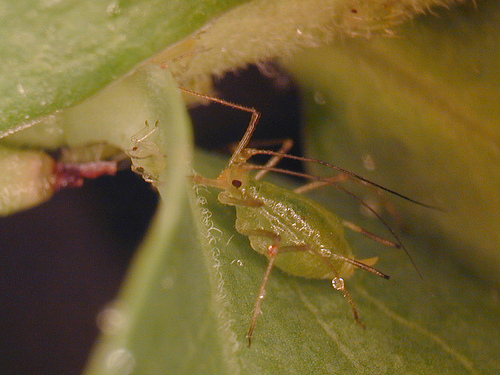Douglas researcher presents ecological pest control
By Dylan Hackett, News Editor
Last Thursday, Rob McGregor, Executive Director of Douglas College’s Institute of Urban Ecology presented his latest research on using biological pest controls for greenhouses in the Lower Mainland titled “What’s eating you?” McGregor explained to the small, eager audience in the 2201 lecture hall how the use of insect pests instead of chemical spraying will both benefit the environment and the quality of vegetation we consume. He also highlighted the many of the economic benefits involved in the process of insect pest control for both farmers and the Natural Sciences and Engineering Research Council’s partner companies who supply and breed the insects. Farmers worldwide lose billions of dollars to crop loss due to pests.
McGregor parried an audience member’s concerns on genetically modified organisms, which he believes to be a much more viable option for farmers and the environment than extending the usage of chemical fungicides, herbicides and pesticides.
“I think genetically modified farm products still have the same [natural pesticide] chemicals they had before. Nothing has changed about them; they’ve just added something to it. You have to think about the whole system as a system that is co-evolving. The plants produce chemicals of some kind and insects evolve chemicals to combat those chemicals and it just goes back and forth throughout evolutionary time.”
[quote style=”boxed”]McGregor also explained how his research has led to the discovery of an insect not thought to be present in the Metro Vancouver and Fraser Valley areas.[/quote]
McGregor also explained how his research has led to the discovery of an insect not thought to be present in the Metro Vancouver and Fraser Valley areas. He also discussed advancements in DNA coding technology and how this is groundbreaking and beneficial to all fields of applied biology.
“We’re doing something which is called ‘barcoding,’ believe it or not: DNA barcoding. There’s a little piece of DNA that exists in each of you and all the organisms on the planet Earth that are eukaryotic,” said McGregor. “It turns out that this is just variable enough between species that you can use the sequence of the gene to identify the species.”
Also mentioned in the presentation was the institute’s future research plans to on local pest controls such as those for pepper and blueberry-feeding aphid species in the Fraser Valley and the importation of Australian and Californian insects to feed upon the aphids.
“Blueberry aphids are something that need to be controlled and is normally controlled with insecticides very early in the spring to prevent the spread of disease called blueberry scorch virus. We think that a cold-temperature organism might be able to substitute for the insecticide,” said McGregor.


